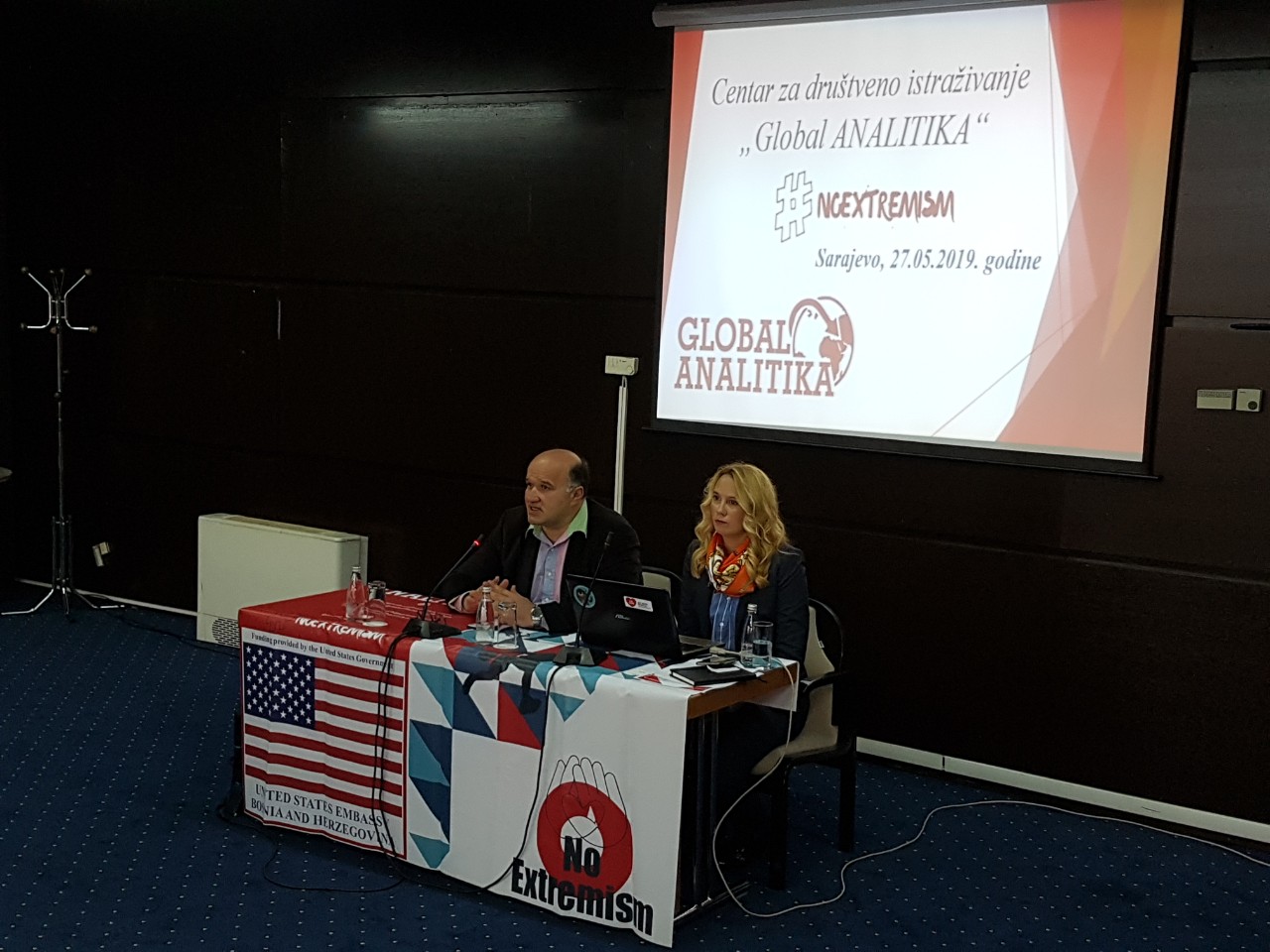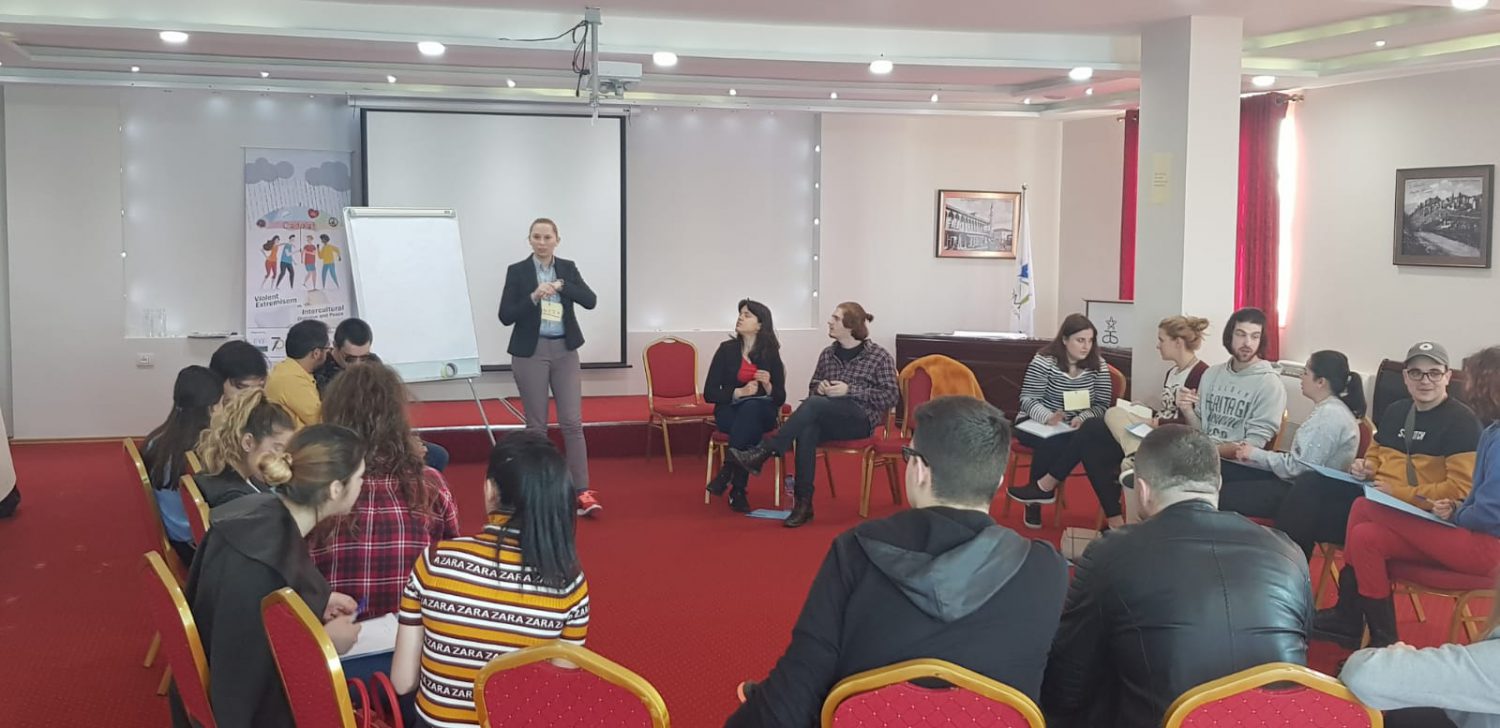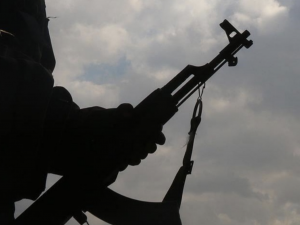Global geopolitical movements, especially for the last 10 years, have been characterized by a greater number of (detected) incidents, some of which are now occurring almost regularly, such as mass military exercises, and violations of the air and water space of other countries, but especially the events of an unconventional, so-called “hybrid” nature, which binds to Russia. The incidents were especially intensified after the Russian invasion of Ukraine and the Crimean annexation, which also reflected directly on the security situation of the countries in the North-Baltic region. The latest security threat to Western interests has been clarified by the Chief of the Armed Forces of the United Kingdom of Great Britain and Northern Ireland, the Air Chief Marshal, Sir Stuart Peach, who has warned these days of a new Russian threat to communications and Internet cables that are under the sea. Peach further states that Britain and NATO must give priority to protecting communication lines and that any interruption of the same “immediately and very catastrophically” could affect the world economy. NATO has prioritized cable protection in response to the threat of modernization of the Russian Navy, both nuclear and conventional, in terms of submarines and ships, explains Peach.
In order to explain the basics of concern, it is important to emphasize that these cables are crossing the seabed, connecting countries, and continents. It is then important to ask the following questions: could Russian submarines be able to “interrupt” the Internet, how much of a threat Russia poses, and how important are undersea cables. The world’s submarine network comprises an estimated 213 independent cable systems and 545,018 miles (877,121 km) of fiber, according to a recent report for the Policy Exchange think tank. But a lack of formal state ownership meant cables do not have strong protection under international law. However, investment in undersea cables is of course not expensive, an estimated 97% of global communications and $10 trillion in daily financial transactions are transmitted by cables under the ocean.
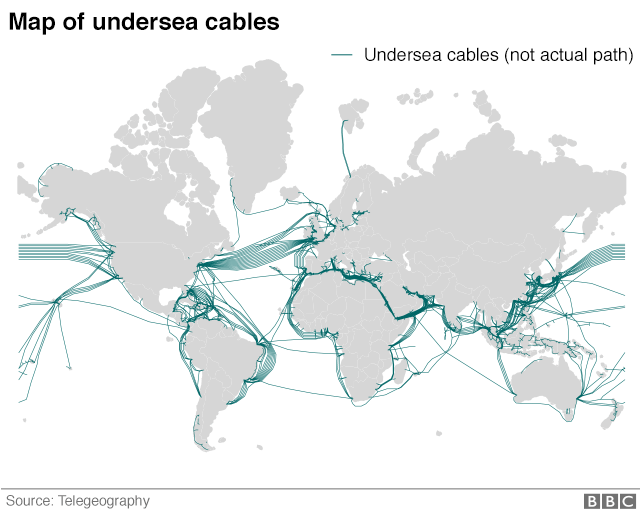
Russian hybrid warfare since 2007.
The chronology of some security incidents in the last 10 years, developed by NBC News from US intelligence sources, shows that Russia has been involved in the following activities:
April – May 2007: Estonia, a small Baltic state that was occupied by the Soviet Union by 1991, angered Moscow by planning to move a Russian monument from World War II and the graves of Russian soldiers. Russia has responded with a temporary suspension of Internet access to Estonia. Distributed Denial of Service attacks (DDoS) was focused on government offices and financial institutions, disturbing communication.
June 2008: In a similar attack, Russia has punished another former landowner in the Baltics. When the Lithuanian government banned the display of Soviet symbols, Russian hackers routed government websites, inserting the sickle and hammer symbols and the five-pointed star.
August 2008: After the Georgian pro-Western government dispatched troops to a breakaway republic, Russian land, sea, and air units carried out the attack, and Russian hackers attacked the Georgian Internet. At that time, for the first time, Russia coordinated military and cyber action, and Internet communication in Georgia was effectively closed.
January 2009: As part of efforts to convince the president of Kyrgyzstan to evacuate the US military base, Russian hackers have been shut down by two out of four Internet service providers in the country, with the DDOS attack. After that, Kyrgyzstan removed the military base and received $ 2 billion in aid and loan from the Kremlin.
April 2009: After Kazakhstan’s press release issued a statement by Kazakhstan’s president in which he criticized Russia, the DDOS attack was carried out and attributed to the Russian elements.
August 2009: Russian hackers turned off Twitter and Facebook in Georgia, marking the first anniversary of the Russian invasion.
May 2014: Three days before the presidential election in Ukraine, a hacking group from Russia, has made a decline in the election commission system. Even the backup system was shut down, but Ukrainian computer experts managed to restore the system one day before the election. The aim of the attack was to create chaos in the country and support the pro-Russian candidate.
March 2014: For the second time, the Russian government allegedly coordinated military and cyber action. There was an attack by the DDOS, 32 times bigger than the one used during the Russian invasion of Georgia. The Internet was broken in Ukraine, while armed Russian and pro-Russian rebels took control of Crimea.
May 2015: German investigators have discovered that hackers have penetrated into the computer network of the German Bundestag, the most significant hacker attack in German history. BfV, a representative of the German intelligence service, said that behind the attack was carried by Russia, with an aim to gather information not only on the Bundestag but also on German and NATO leaders.
June 2015 – November 2016: Russian hackers penetrated into computers in the Democratic Party in the United States and received access to personal e-mail messages from Democratic officials, which WikiLeaks distributed to global media. The CIA and the FBI now believe that these activities were aimed at undermining the election, by causing damage to Hillary Clinton and helping Donald Trump win the presidential election in the US.
October 2015: Security experts believe that the Russian government has tried to hack the Dutch government’s computers to come up with a report on the MH17 flight record of Ukraine. The Dutch Security Committee led an investigation regarding the fall of Malaysia Airlines’s plane and concluded that a passenger plane was knocked down by Russian missiles fired from areas held by pro-Russian rebels.
December 2015: The hackers carried out the attack and took over the control center of the Ukrainian electricity distribution company, blocked the controllers of these systems, which led to the disappearance of electricity in 235,000 households.
January 2016: Security agencies in Finland have published information to believe that Russian hackers stood behind the attack on the Finnish Foreign Ministry several years earlier.
December 2016: BfV chief Hans-Georg Maasen warned earlier: “There is growing evidence of attempts to influence federal elections next year,” referring to parliamentary elections in Germany, held in September 2017.
Maasen specifically determined Russia as the source of the attack, adding: “We expect further increase in cyber attacks in the upcoming elections.”
Experts believe that the Russians are trying to damage the current Chancellor Merkel, who has supported sanctions against Putin’s personal associates after Russia annexed the Crimea.
Scott Borg, President of the U.S. The Consequences Unit, a cyber company that monitors Russian attacks, says they even grow the ambitions of Russia, and that it operates on a much smaller scale.
Borg states, “They tried to influence local elections in three or four East European countries, as well as in Germany.”
Influence and action of Russia in the Balkans
“Russian influence is already felt through the increased staff presence and statements by the Russian Foreign Minister, as well as through the activities of the Russian Embassy in the country,” said Macedonian Prime Minister Zoran Zaev.
Given that the countries of the Western Balkans are most likely candidates for NATO accession, this is also one of the main long-term drivers of Russia’s foreign policy, aiming to maintain its influence. Moscow does not observe the small Western Balkan countries that are planning to join the US-led alliance as a direct threat because the region is already separated from the Russian border by the belt of other NATO countries. But the leadership of Russia fears that the renewal of the NATO enlargement process will likely create an expansionist impulse that could expand into the post-Soviet space. Unlike its activities in the countries of the former SSSR, which at the moment reminds us of “bullies from school”, in the Balkans, Russia has no necessary conditions to achieve an undeniable influence. This is primarily reflected in the relatively strong presence of the United States and the European Union, whose funds far outweigh what Moscow can do. The Kremlin then does not have anything left to play on the map of heating up and cooling local tensions by strengthening the political influence on individual local leaders. Many would call this move a card of pure opportunism, the use of an unspecified situation on the ground to achieve their own goals, which local masters often consent to achieve their personal goals above, which can find a link in an emotional relationship with Russia. Although in essence, it is only about achieving personal, political or financial goals, because it is often the case of persons who have lost all credibility in the international community, that is, the EU and the US, and do not act as trusted persons, with whom cannot be build a prosperous policy based on reconciliation and focusing on key life issues.
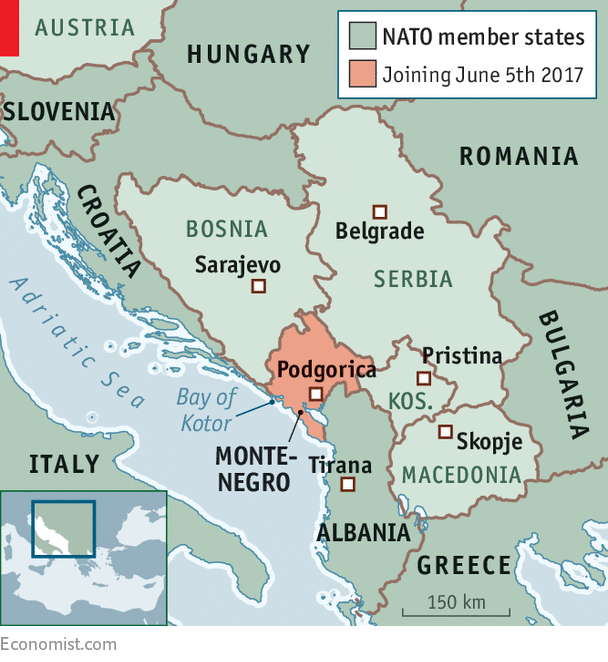
A map of current NATO members in the Balkans
In all of this, the primacy over the tools is held by the media, which are one of the main means of spreading Russian influence, many articles of Sputnik are supporting, which in an impertinent way try to encourage and intensify the intolerance using the tactics of “mischief, and rule”. Sputnik Agency is the main creator of public opinion in the area of defense and geostrategy in the Balkans, and the main news appearing in the leading media is filtered to respond to the Russian narrative. One of the similar examples of information is also the interview by Sputnik with Emil Vlajki, former vice president of Republika Srpska. This article, which was published as a reaction to the sharp condemnation of Washington in a referendum, contrasted with the fact that the United States has made the maximum contribution in terms of establishing sharia law in BiH.
In an article in the same media of October 2, 2017. An interview with the Russian ambassador in BiH was published, which confirms the increased Russian interest in BiH, especially after Montenegro’s entry into NATO. In the mentioned interview, Russian Ambassador Petar Ivancov states:
“Attempts to get BiH into NATO are present and become more energetic, and I think that our position is well known and I do not need to explain it.” We do not consider NATO membership to contribute to the strengthening of the real security of a country. We oppose further NATO expansion in the Balkans. But this is definitely a sovereign choice of the people of the state, and in this case, we see that there is no unity in BiH for the benefit of NATO membership. At least part of the state is against it.”
Unfortunately, Sputnik’s information is regularly transmitted by the media in Serbia, but also in BiH, which is a classic disinformation of the public, and in that way it influences the mutual relations between the peoples of BiH and the region. In their reporting, Sputnik journalists do not ignore unconfirmed information, make the correlation between events, countries and individuals who do not have a clear link, try not only to discredit the role of the United States in the world, but also the role of its allies.
From all of the above, it is evident that Russia has learned how to balance on the waves that produce corruption and national intolerance in the Balkans, and on the one hand, and insufficiently strong support for the EU and NATO integration of the Western Balkans by the EU and NATO members themselves, on the other pages. When we take examples of Russian actions or more precise hybrid warfare in the former Soviet republics, then in Montenegro, and some activities supported and implemented by some politicians in BiH, it is not excluded that some of the scenarios already seen in BiH can be repeated in certain circumstances.
We conclude this analysis with a part of the text published by Foreign Affairs:
Russia’s plan for Bosnia will be shaped by two major factors. The first is the Kremlin’s long-standing relationship with Milorad Dodik, the secessionist president of Republika Srpska, Bosnia’s Serb-dominated autonomous region. The second, more alarming factor is the emerging link between Moscow and Dragan Covic, the Croat member of the country’s three-person presidency and head of the Croatian Democratic Union of Bosnia and Herzegovina (HDZ BiH), an offshoot of the Croatian Democratic Union (HDZ), the current governing party in Zagreb.
Similar warnings in recent months come from the reference representatives of state institutions in the United States, the EU, the United Kingdom and Germany, with clear messages that strong and urgent support is needed for BiH, as well as for the rest of the Western Balkan countries, in their efforts to become full members of NATO and EU.




